Xenoblade Chronicles is not a game with an explicit metanarrative in the vein of This is Not a Game or Save the Date. It does not discuss saving or pause screens or any other extradiegetic moments- although the Xeno series is no stranger to meta events, such as the manufactured save points in a factory of Xenogears.
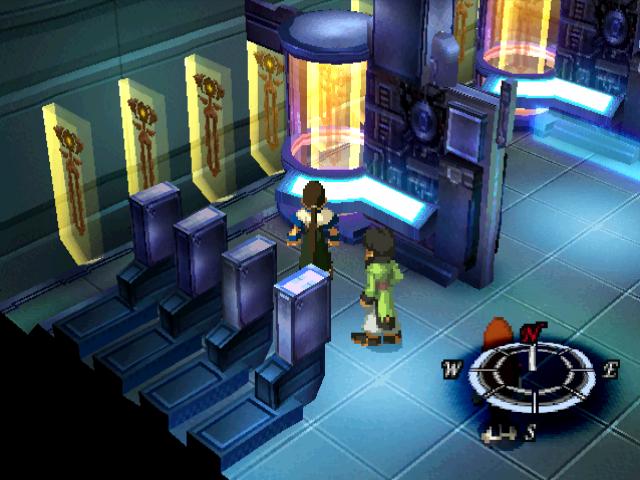
Xenoblade, however, simply proceeds as a typical fantasy JRPG, with the characters unaware that they exist in a game universe, or are controlled by a player- yet, even without explicit metanarrative, both of these assumed aspects of role-playing video games are interrogated within the story. In analyzing these themes, I hope to raise and answer some questions about the genre and practice of meta-narrative as a whole. How does Xenoblade address the assumptions of identification and game rules within its own universe? What does this say about meta-games as a genre, and the ways in which we view meta-media?
The first semi-meta aspect of Xenoblade is the idea of player control. While a more explicit meta-narrative might have the protagonist understand they are controlled by a player, or an AI, Xenoblade’s diegetic explanation for the protagonist’s lack of agency is possession by the god of his universe.
“What was I doing? What was the purpose of my life? No. I’ve got it wrong. I was never alive. It was Zanza! All along! I… Everything I did was…”
Shulk
Here, Xenoblade implicitly interrogates the nature of artificial life, and what it means to truly be alive- to have self-determination.
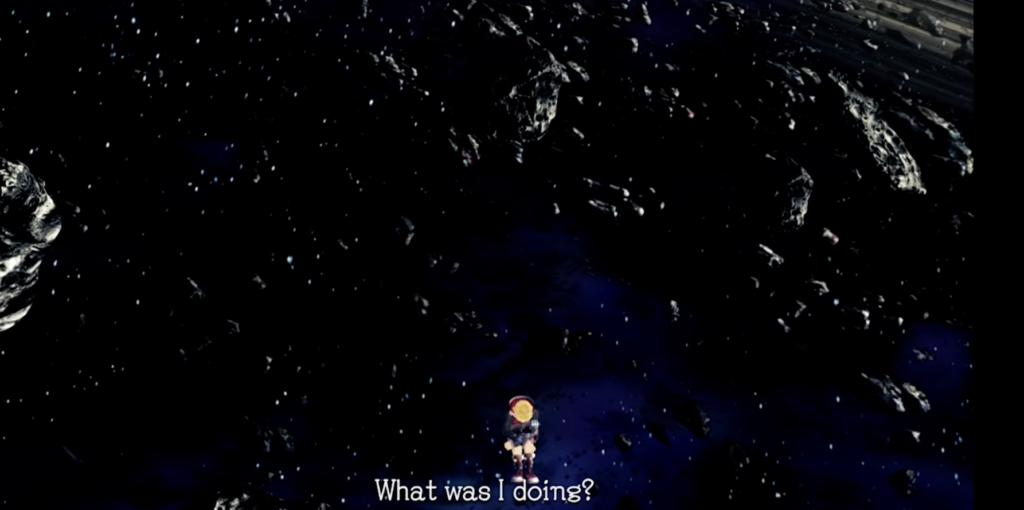
Even without bringing up the player, Xenoblade alludes to the player through its main villain, Zanza, and his control over the protagonist Shulk’s actions. Its deliberately raised questions about the point of taking action without direct control can just as easily be poised at the player who commands Shulk in gameplay. To an extent, insofar as the villain is puppeteering Shulk without his consent, and you are also doing so, the player has been implicated as the villain of this story.
Xenoblade’s second quasi-meta element comes at the end of the game, when it is revealed that the world of Xenoblade is not the simple fantasy setting assumed by the player. Instead, the world the player has come to know was first an experiment in our world- either a pocket universe or a simulation, as it is overseen by a supercomputer- in much the same way that Xenoblade Chronicles the game is a simulation in the player’s Wii.
“We are about to bear witness to the birth of a universe.”
Zanza
“It was simple curiosity. The curiosity of a single man that destroyed the universe and created a new one. A new universe, your world, was born.”
Alvis
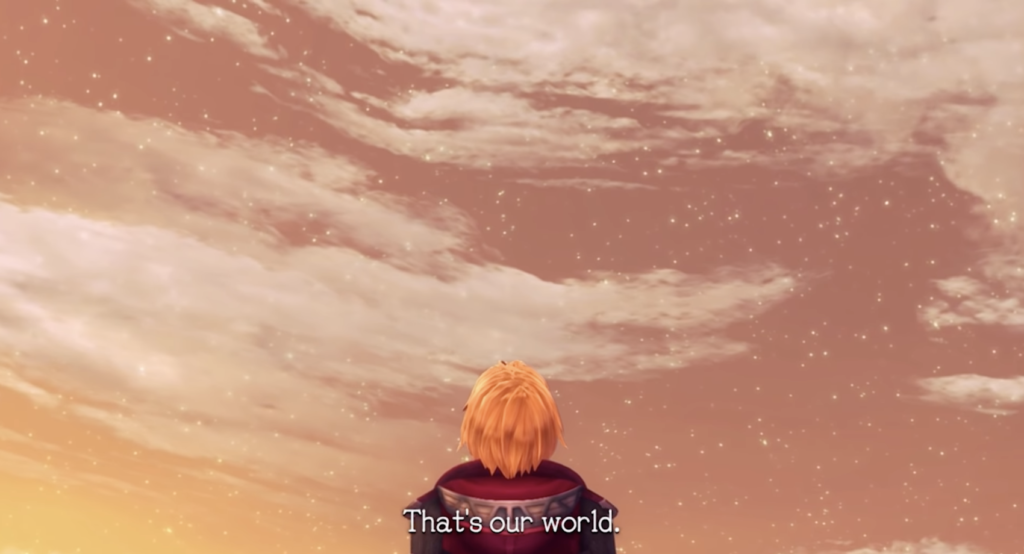
Shulk ends the game with awareness that he exists in a simulated universe, although not aware that it is a video game as a character in a more explicit meta-game would. He is never aware of extradiegetic elements like music or menus, yet he does realize that his world was deliberately created (though doesn’t particularly understand the idea of a supercomputer or simulation).
Similarly, the game’s theme of deterministic, unchangeable fate addresses the structure of the JRPG, a notoriously linear game genre. In JRPGs, there is one story, the player has little to no impact on the main character’s choices in the narrative, nor customization of said main character, and there are very few branching paths or alternative endings. It is ironic, therefore, that most JRPGs feature in their narratives battles with gods or fate itself- and Xenoblade is perhaps the most clear example of this theme. The characters struggle against the concept of predetermined destiny, while the narrative itself unfolds in only one particular way.
Yet, the structure of Xenoblade actively resists the linearity of JRPGs- it features a full open world, with freely explorable areas, and a vast array of side quests and optional content that the player can complete. While the main narrative is stiflingly linear, the game also boasts a richly detailed world with a great deal of optional content, pushing against the idea of a predetermined path in much the same way Shulk does in the narrative itself.
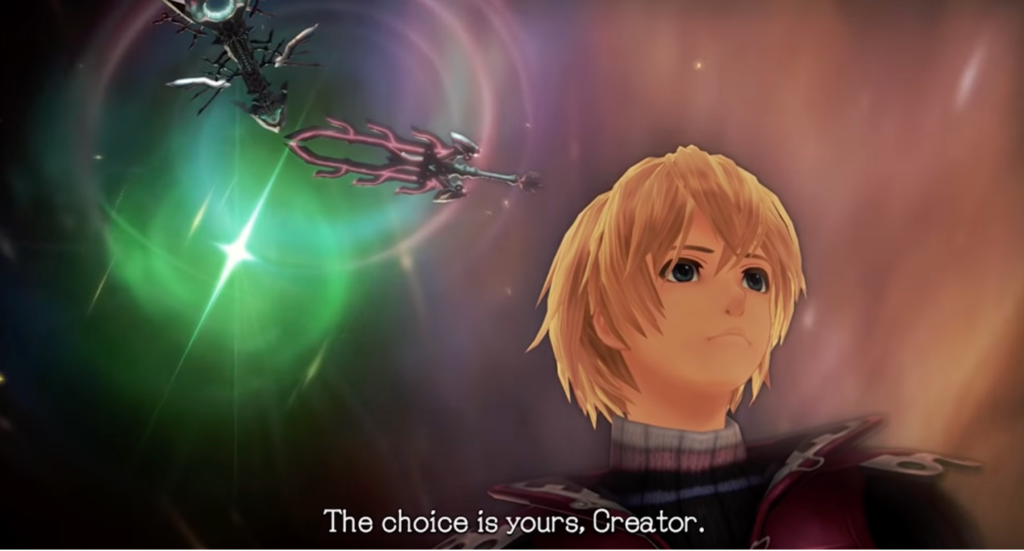
“I won’t decide. The future should be decided by each and every person in the world. And so, what I… no, what we wish for is… a world with no gods!”
Shulk
Ultimately, Xenoblade’s thesis statement is in staunch support of individual identity and free will. The game ending as Shulk decides to create a truly free world is a poignant commentary on the nature of the game itself- that perfect control over a world is impossible and meaningless.
There is no playable game after this point in the story- after Zanza has been defeated, and the determinist crux of the world rewritten, the player cannot control Shulk nor interact with the world of Xenoblade Chronicles any longer. Interestingly, Xenoblade seems to thematically rebuff the idea of a controllable video-game, in the meta-procedural practice of removing control from the player after free will has been instated in the world.
Although there were no explicit meta-elements, nor a metaprocedural structure, Xenoblade still fascinatingly evokes many of the themes and questions found in metagames in its diegetic narrative by alluding to meta elements. In much the same manner as Doki Doki Literature Club or There Is No Game, Xenoblade forced me to think about my interaction with role-playing games, and if such a thing was moral or reflective of the real world. While works like Deadpool might employ meta-elements without critical examination, works like Xenoblade can evoke meta-criticism without actual meta-elements. This insinuates that the scope of meta-examination is wide and inclusive, and ultimately holds fascinating implications for player interaction with games and the concepts of virtual world at a whole. Meta readings can encompass games that may not possess explicit meta elements.
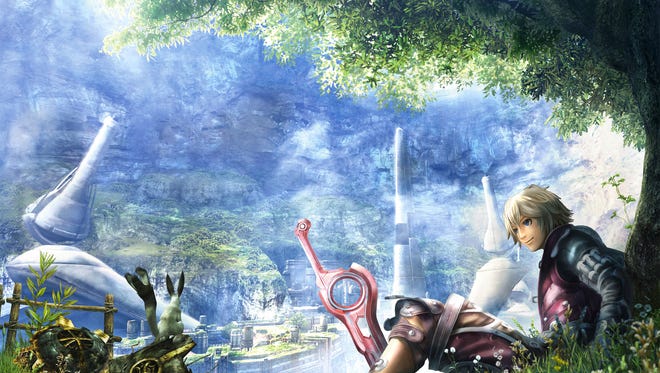

I think we all knew this post was coming.
But seriously, nice job on the reading. I hadn’t considered Xenoblade to have direct metagame related themes, even though they spoke so much about the nature of simulations in general.